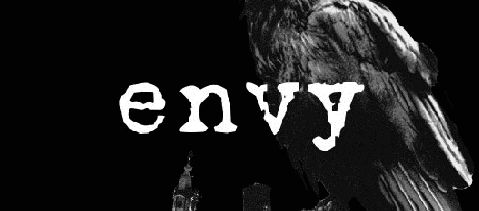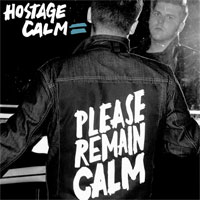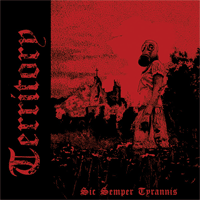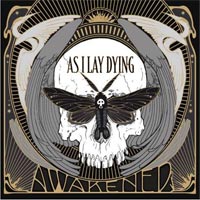
ENVY
I’m never quite sure what to make of an ENVY release, except that it makes me feel emotion on a level that U.S. bands have a hard time matching, despite the language barrier between ENVY and I. So, when I got the chance to interview them thanks to the promotional cycle of Recitation, I jumped at it and tried to figure out later how I’d do it, as members of the band are not native English speakers. Luckily, I was able to talk Matthew Nusko into translating the questions into Japanese for ENVY’s vocalist, Tetsuya Fukagawa, to answer. Obviously, some questions worked better than others. But! Here it is!
Pastepunk: Both Insomniac Doze and Recitation covers are very austere and lonely images. What is the etymology of those images? How do those images relate to the music?
Tetsu: The designs are all by the same designer. We tell her what the songs are about and she comes up with the design. We always ask her to make it abstract rather than elaborate designs. As far as any relation it has to ENVY, I guess it’s all good as long as someone takes a look at it and thinks it’s ‘envyish’.
Pastepunk: I would imagine a lot of nuances in lyrics get lost in the translation, no matter how faithful or inventive, so, can you speak about the events that led to “Life Caught In the Rain” and “Light and Solitude”?
Tetsu: A good and long-time friend translates the lyrics for us. We discuss the lyrics in detail before he translates it so I think it’s done properly. Obviously there are Japanese nuances that are lost in translation. “Life caught in the rain” and “Light and solitude” are words to describe my emotions and feelings of living our daily lives. More of an expression than experience.
Pastepunk: Was there anything you would do differently today in Transfovista? Without subtitles the whole thing seemed rather bizarre.
Tetsu: There’s nothing I’d change. We spent a lot of time on this with our video director who we trust. When I watch this and see our past, it makes me realize that we’ve made the right choices. Having said all this, maybe we should have put in subtitles.
Pastepunk: What made playing at Fuji Rock festival so exciting to ENVY as a young band?
Tetsu: We were pretty nervous before the show. I think it takes some courage for a band like us to perform at a big festival like that. We were worried that people wouldn’t really be into it but it turned out to be a great show. It’s one festival we’d love to do again. The lineup that day was great as well… ISIS, MOGWAI… lots of good friends.
Pastepunk: Is there a particularly baffling belief that foreigners (please don’t use gaijin here, Matt) have projected onto the band?
Tetsu: In every country we go to, our fans welcome us and respectfully listen to our music. Touring overseas is an educational experience for us and it’s these times that we’re really glad to be playing music. The biggest difference is probably that fans overseas are much more energetic than Japanese fans.
Pastepunk: What was the intent behind the video of “Worn Heels and the Hands We Hold”?
Tetsu: We thought that this track in Recitation is the most “ENVY sounding” song, and decided to make a video. We came up with the storyline with the idea of trying to relay the idea of conflict and solitude from living day to day, and wandering with our emotions towards a goal, into a video format. The actress that was in the video portrayed what we were trying to get across nicely. The video turned out really good.
Pastepunk: You said Recitation was characterized by having more fun in the studio. What made it more fun than previous discs and is that fun something that the audience recognizes?
Tetsu: We got to spend a lot of time on production this time. We weren’t rushed which made it much more enjoyable. We write the music in hopes that our listeners can feel that in our music. I think that because of this, we were able to express ENVY’s pop side, which we’ve never done before. Hoping it all gets across to our listeners.
Pastepunk: Recitation does not have songs longer than ten minutes? Was this conscious?
Tetsu: Yes, we decided not to make longs songs this time. We’ve made long songs in the past since all five of us take part arranging the tracks and with all our ideas, the songs got longer and longer. We found that instead of making long songs, which is easy, we decided this time to compile and compress our ideas. I think that its natural for songs to be long when too many ideas are thrown in.
Pastepunk: How does the assumed closeness and exaggerated rhetoric of hardcore punk (stagedives, sing alongs) interact with Japanese culture, if at all? Is it hard for other people not already within the sub-culture to see the resonance?
Tetsu: There’s always been hardcore punk bands in Japan. Many of them with great originality. They are the rock for the Japanese hardcore punk scene today which they have built up. I think that they have created a part of youth culture over here. There are people like me who were captivated the first time they heard hardcore punk and there are those who never want to hear it again. Sympathizing and accepting something depends on all kinds of things, personal situations, etc. But I think that the global network of punk is vast, more so than most kinds of music. Truly amazing music.
Pastepunk: Is there any chance for further reissues (From Here to Eternity, Breathing and Dying, Angel’s Curse Whispered) on American soil?
Tetsu: We spoke to Jeremy from Temporary Residence on the US tour and we discussed the possibility of reprinting all the analogues and selling a box set. Hoping it’ll happen.



